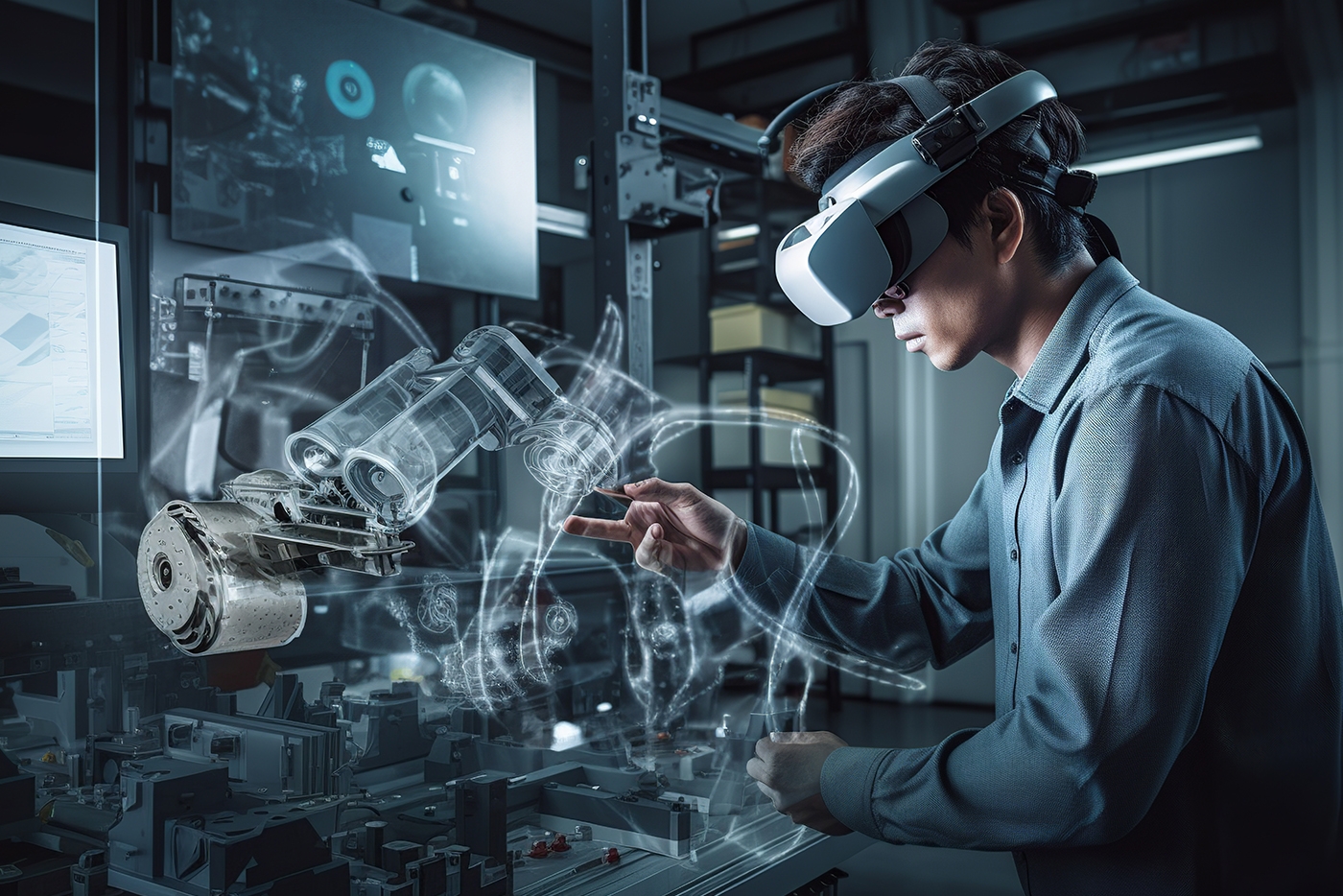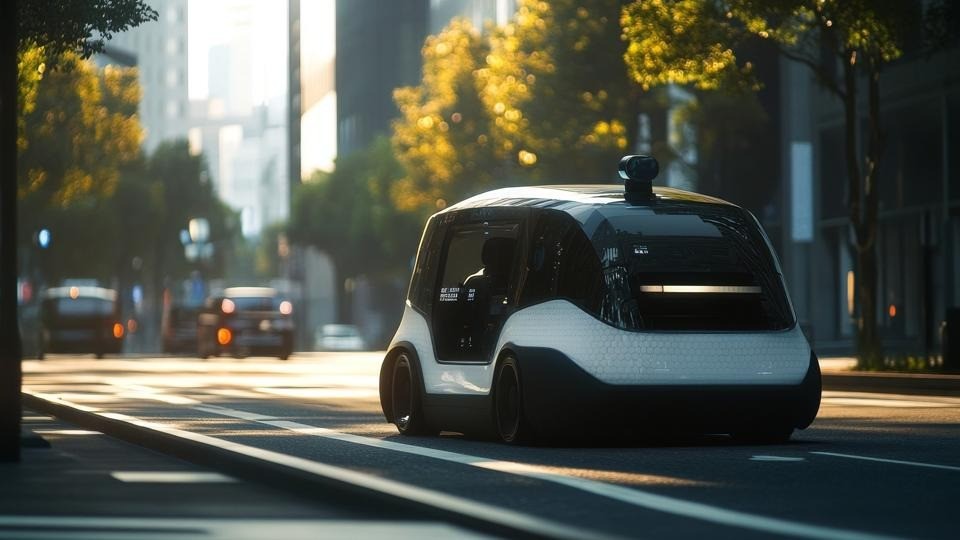The Future Of Manufacturing: Generative AI And Beyond
2 August 2023
The manufacturing and industrial sector is currently undergoing a transformation with the advent of generative AI, the metaverse and web3 technology. Organizations can now use cutting-edge tools and solutions to streamline operations, increase efficiency, and enhance the customer experience.
Let’s explore the ways in which the metaverse, AI and web3 technology are transforming manufacturing and industrial organizations and what the future of this sector may look like as a result.

Manufacturing And The Metaverse
The integration of metaverse technology into the manufacturing sector has the potential to revolutionize the way companies operate, providing new opportunities for optimization, innovation, and growth.
Companies can use immersive technologies like VR and AR to enhance employee training, warehouse processes, quality control, and even product design.
The multinational aerospace company Airbus is using AR to overhaul its quality control processes. Their team uses drones fitted with LIDAR sensors to conduct fly-around inspections, and then the drones transmit data to human inspectors who examine the information using tablets and AR glasses.
With digital twin technology, organizations can simulate products, machines, and even entire factories. As a result, the concept of the industrial metaverse has emerged, with virtual systems reflecting real-world ones. Artificial intelligence, digital twins, sensors, and more come together in the industrial metaverse to create simulations that inform real-world actions.
Manufacturing companies can use digital twin simulations to test and validate new production techniques and systems before they are implemented in the physical world, reducing the risk of costly mistakes.
Metaverse technology also enables companies to create virtual prototypes of their products, allowing them to test and refine designs in a realistic, immersive environment. This can significantly reduce the time and cost associated with physical prototyping and testing, helping companies to bring products to market faster and more cheaply.
Boeing is embracing the idea of the industrial metaverse, and the company is already building digital twins of their airplanes, along with simulations of the production systems that will build the planes. Engineers can run complex operations in the virtual world before taking action in a live manufacturing setting.
How Web3 Will Transform Industry
Companies are beginning to use web3 technologies to improve logistics and supply chain processes. Blockchain and smart contracts promise to increase data security, traceability, and transparency while reducing costs and administrative time.
Manufacturing companies can use blockchain to track goods in real time, reducing the risk of lost or stolen items and improving delivery times. The technology can also help with customs clearance, reducing the need for manual paperwork and speeding up the process.
Additionally, smart contracts can automate processes and reduce the need for intermediaries, improving efficiency and reducing costs. For example, IBM and Maersk have partnered together to create a blockchain system called TradeLens, which functions as a single source of truth that stakeholders can use to create automatic smart contracts, carry out credit checks, and get notified when ships arrive in port.
Blockchain and AI technologies are also helping companies accelerate the transition away from fossil fuels. Shell worked with Amex and Accenture to create a public blockchain-based chain of custody system that helps increase the availability and use of sustainable aviation fuel.
It is possible that an increasing number of manufacturers will integrate NFTs into their products, granting exclusive access to VIP perks, content, and other benefits.
AI And Generative Manufacturing: A Revolutionary Alliance
Artificial Intelligence (AI), particularly generative AI, is set to further accelerate the transformation of the manufacturing and industrial sector. With its ability to leverage vast amounts of data and predict outcomes, AI can significantly improve decision-making processes, optimize production lines, enhance product quality, and reduce waste.
Generative AI, a subset of AI, involves algorithms that can generate new content or designs from scratch, given a set of rules and inputs. It’s much like a skilled artist given a canvas, colors, and a general theme, who then creates an entirely new piece of art. In the context of manufacturing, this implies the creation of optimized design alternatives for parts, products, or even entire production processes.
Companies are beginning to employ generative AI in their design and development stages. By feeding parameters and requirements into generative design software, companies can obtain optimized design solutions that not only meet their criteria but also present options they might not have considered. These designs can then be tested and refined in the metaverse, leading to innovative and efficient real-world applications.
For example, automotive companies like General Motors are already using generative design algorithms to optimize parts and reduce weight in their vehicles. The algorithm generates several design alternatives, which are then evaluated and selected based on performance under simulated real-world conditions. This results in components that are lighter, stronger, and often more cost-effective.
Integrating AI into manufacturing operations can also provide significant advantages in predictive maintenance. By learning from historical data, AI can predict when a machine is likely to fail or need maintenance. This preemptive approach allows companies to avoid costly downtime and extend the life of their equipment.
Additionally, AI can be used to enhance supply chain management. Predictive analytics can help anticipate demand patterns and optimize inventory management, while natural language processing can assist in automating customer service.
The New Industrial World
The convergence of AI, particularly generative AI, with metaverse and web3 technologies is creating a new frontier in manufacturing and industrial operations. Companies embracing this trinity of technologies will likely find themselves at the forefront of the next industrial revolution, armed with tools that foster innovation, efficiency, and sustainability.
Related Articles
Flying Taxis And Self-Driving Trucks Arrive In 2026: 6 Transport Trends To Watch
By now, “smart” versions exist of just about every home appliance, gadget and gizmos we can think of. However, manufacturers continue[...]
Technology in Action: My Key Takeaways on How AI and Quantum Are Accelerating Global Transformation
By now, “smart” versions exist of just about every home appliance, gadget and gizmos we can think of. However, manufacturers continue[...]
Sign up to Stay in Touch!
Bernard Marr is a world-renowned futurist, influencer and thought leader in the fields of business and technology, with a passion for using technology for the good of humanity.
He is a best-selling author of over 20 books, writes a regular column for Forbes and advises and coaches many of the world’s best-known organisations.
He has a combined following of 4 million people across his social media channels and newsletters and was ranked by LinkedIn as one of the top 5 business influencers in the world.
Bernard’s latest book is ‘Generative AI in Practice’.






Social Media